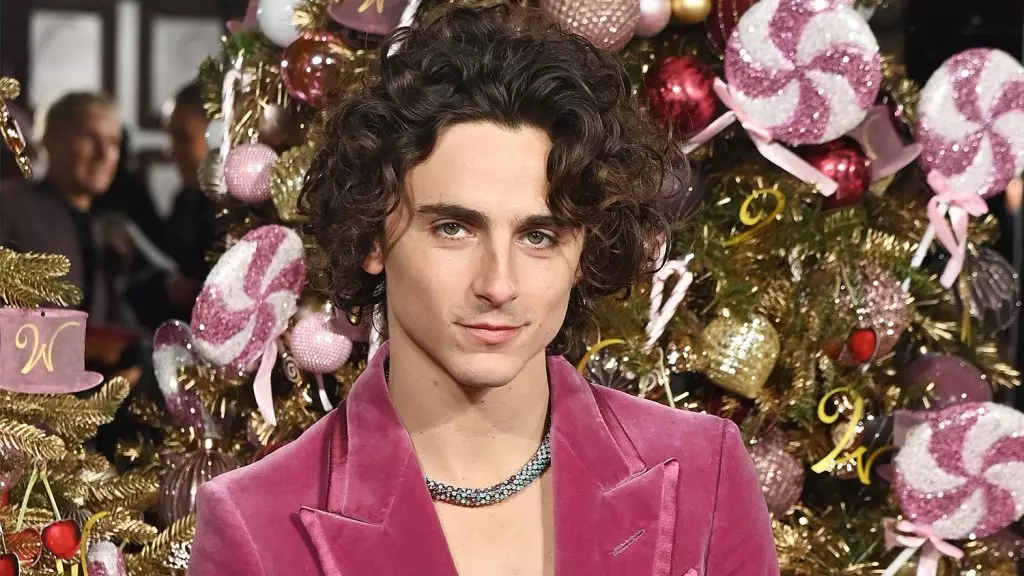Timothée Chalamet, the acclaimed actor known for his remarkable performances, recently opened up about the challenges he faced in the entertainment industry due to his physical appearance. In a discussion with Zane Lowe while promoting his role in the upcoming biopic *A Complete Unknown*, which details Bob Dylan’s emergence as a music icon, Chalamet reflected on his experiences of being typecast. He acknowledged that certain opportunities were simply not available to him due to societal standards regarding looks and body image.
Chalamet’s journey in Hollywood has not only been characterized by the inherent struggles of an aspiring actor but also by a deep connection to the feelings of alienation experienced by musicians like Dylan. Chalamet argued, “Being an outsider can often be a powerful catalyst for creativity.” This sentiment resonates with his artistic philosophy and highlights the threads of resilience that have woven through both his and Dylan’s stories.
By admitting that he felt at a disadvantage during auditions for blockbuster franchises such as *The Maze Runner* or *Divergent*, Chalamet illustrates a prevalent issue in Hollywood: the struggle for aspiring actors who do not conform to traditional molds. Agents would provide feedback focused on his physique rather than his talent, insinuating that he needed to change to fit a specific image. This recollection underscores a significant barrier that many face in the industry; the notion that physical attributes matter more than the craft itself is an uncomfortable reality for countless performers.
However, rather than succumbing to the pressure of conforming, Chalamet carved out his niche in independent cinema. His notable performances in films such as *Beautiful Boy*, *Lady Bird*, and *Little Women* showcase his commitment to authenticity and his desire to engage with emotionally resonant narratives. Chalamet’s shift away from conventionally commercial projects toward more personalized stories mirrors Dylan’s migration into the folk music scene, further emphasizing the symbiosis between their artistic endeavors.
In discussing the evolution of his career, Chalamet remarked on how he “found his rhythm” through these intimate storytelling experiences. Just as Dylan began to define his unique sound within a burgeoning New York City folk scene, Chalamet discovered his voice in a realm less cluttered by the commercial pressures often associated with big-budget films. This alignment of purpose and passion allowed him to thrive amidst adversity—crafting performances that resonate deeply with audiences and critics alike.
The more recent successes of Chalamet, including his lead roles in *Dune* and the musical *Wonka*, signify a powerful juxtaposition to his earlier struggles. With a reported box office return surpassing $2.5 billion, he has undoubtedly emerged as a “big movie actor” in his own right, proving that perseverance and dedication can lead to monumental achievements in a competitive landscape.
*The Complete Unknown*, directed by James Mangold, showcases Dylan’s transformation from an unknown artist to an international sensation during a period marked by social upheaval and vibrant cultural change. The film, set in the 1960s, not only narrates Dylan’s journey but also provides an intimate peek into the creative struggles that are often overlooked. Chalamet’s portrayal of Dylan’s character highlights the shared experiences of isolation and the hunger for self-expression that have defined the journeys of both artists.
Chalamet’s co-starring role alongside Elle Fanning, who plays Sylvie Russo, further enriches the narrative tapestry of the film, promising to unveil the personal battles behind a legendary career. Just as Dylan’s music reflected his tumultuous environment, Chalamet’s filmography mirrors his evolution as an artist, reflective of a generational voice yearning for connection and authenticity.
Timothée Chalamet’s trajectory, marked by initial rejection and subsequent triumphs, serves as a testament to the importance of identity and self-advocacy in the arts. His reflections on typecasting reveal a broader discussion about representation and acceptance in the film industry, emphasizing that genuine artistry often thrives outside the traditional confines. As both he and Dylan have exhibited, embracing one’s individuality in the face of adversity can lead to unparalleled creative breakthroughs, ultimately forging a path for future generations of artists.


Leave a Reply